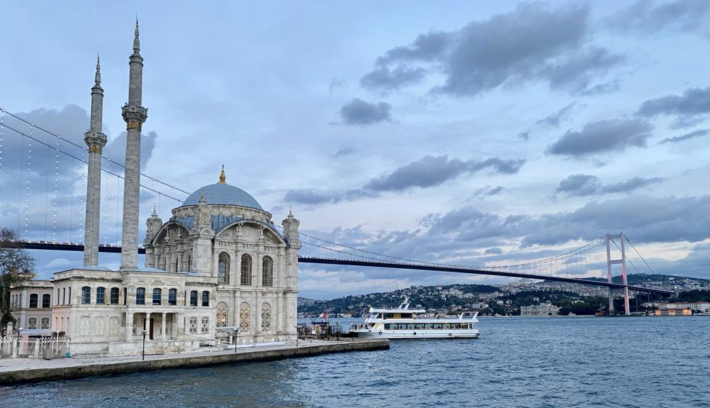The city of Istanbul, situated at the intersection of Europe and Asia, possesses a distinctive political landscape shaped by its rich historical past, diverse population, and unique geographical location. Walking through the streets, we observed the architectural wonders of Istanbul, the city became a living testament to its historical epochs— from Jewish quarters to Ottoman landmarks. Identifying the diverse architectural styles enriched our understanding of Turkey’s history and highlighted the intricate interplay of cultural influences over the centuries.
The tension between secular and conservative political forces is evident in Istanbul, notably in the two distinct parts, the ‘European’ and ‘Asian’ sides. The city is a captivating microcosm where conservative and secular influences interweave, reflecting Turkey’s complex political and national identity. Furthermore, Istanbul’s role as a significant economic hub prompts discussions on its identity, with ongoing debates over its European connections and ties to Asia and the Middle East.
Engaging with Turkish academics provided insights into the historical and contemporary narratives that define Turkey, such as Kemalists, Islamist nationalism, etc. Turkey’s trajectory has been shaped by reforms under the leadership of Mustafa Kemal Atatürk, who called for abolishing the Sultanate and Caliphate, adopting a new alphabet, and implementing social and educational reforms. His legacy remains the focal point of Turkish nationalism.
Decades later, Turkey embraced neoliberal economic policies aligning with the International Monetary Fund (IMF) recommendations. This shift towards privatisation and deregulation aimed at promoting economic growth but came with consequences. The resulting challenges in relations with the European Union (EU) and the perceived widening of social and economic disparities sparked criticism.
This criticism extended to discussions about the status of women in the 100 years of the Turkish Republic, highlighting the complexities of societal transformations and inequalities brought about by these policy shifts. The intersection of political, economic, and social reforms has played a significant role in shaping Turkey’s contemporary landscape, sparking ongoing debates about the nation’s development and the inclusivity of its progress.
This holistic experience in Istanbul interlaced history, culture, politics, and academia, fostering a comprehensive and nuanced understanding of Turkey.
Sabihah Miah

Jamespigma
SEOlovin.com – продвижение сайтов от маркетолога Александра Головина. Аудит, оптимизация, контент-маркетинг для роста трафика и конверсии. Привлекает аудиторию из социальных сетей. Отчеты и аналитика. Эффективные и проверенные методы продвижения.